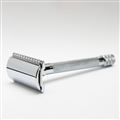10 Ways to Finally Avoid Overspending
We're all creatures of habit. Many of these patterns develop subconsciously, making them even harder to kick. Maybe you're the type of person who always splurges on purchases after a bad day. Or maybe you can never resist picking up that bar of chocolate from the checkout line. Every single time.
 |
You may not even realize how many times your natural tendencies are what's prompting you to part with your money - and not your actual need for something. Companies realize this and target their marketing messages to you accordingly. As with conquering all habits, the first step is self-awareness so you can learn to work around your instincts and avoid spending mistakes. Syble Solomon, a personal-finance consultant and founder of LifeWise Strategies, let us in on the sneaky ways our psychology can fool us into overspending. With more awareness during your trips to the mall and at the checkout line, you can become the intelligent shopper you were always meant to be:
1. See Through the Displays
A classic marketing trick revolves around the fact that people are likeliest to buy items that they see right away. That's why, Solomon says, "Things at eye level are typically more expensive than comparable items placed on higher and lower shelves." Similarly, just because there's a display case at the corner of an aisle doesn't mean that the products are on sale. Flashy signs don't necessarily mean that the items are a particularly good deal.
2. Know Your Own Internal Clock
For example, Solomon says, "If you tend to be very energetic in the morning and have an attitude of 'I can do anything,' you may overspend thinking you'll figure out how to pay the bill when it comes." Similarly, being tired makes you more vulnerable, so if you're always exhausted after lunch, it's probably not best to go shopping during your afternoon slump.
3. Be Aware of Context Clues
Because of "price anchoring," people make guesses as to how much something should be priced, based solely on another price they see - even when one price has nothing to do with the other. As a result, they could end up spending too much on an item. "People say to themselves, 'This one is too expensive, but I would feel cheap buying the other one,'" Solomon says. "Then they buy the one in the middle price range." Instead of falling prey to this effect, do some research ahead on the items you will buy and consider what your price limit should be.
Similarly, be careful about absorbing too many clues around you about pricing. If you go out to eat at a restaurant where most meals are $25 to $50, a $15 salad will seem inexpensive and you won't think twice about ordering it, Solomon says. Yet if you go to a restaurant where the average meal is $10 to $25, that salad would seem outrageous.
4. Check Out the Ounces
"Containers are really deceiving - often the visually larger container actually holds less of the product than the smaller container," Solomon says. Companies sometimes splurge on larger, attractive containers and packaging to give the perception that there's more product in a container than there is. She shares a recent story in which she bought two comparable lotions: "One was a very well known brand and the other was the drug store brand. They had the same amount of lotion, but the brand name item had a large, high lid that doubled the size of the package!" This trick is especially common at dollar stores, she notes.
5. Think About Cost per Use
Solomon recommends setting a target "cost per use" in advance, before buying your clothes. Let's say you don't want to pay more than $5 each time you wear a clothing item. "If you want a really trendy blouse that you'll probably only wear six times in one season, you could justify spending $30 but not $75," she says. "If you were buying pants that you'll wear a few times a week for maybe more than one year, you can justify spending more money."
6. Remember You're Special - but Not That Way
Solomon recommends ignoring sales language implying you're extra special. Examples include "You've been selected" and "This offer is only available to a limited number of people." Such phrasing "plays to a person's need to be acknowledged as special, deserving, and more important," Solomon says. "Research shows that if a credit card company sends out two identical offers, they will get a significantly greater response if the envelope says, 'You've been selected for a special offer' than if it says, 'We can save you money!'"
7. Visit Freestanding Stores
If you shop at a department store with lots of other merchants nearby, you may be tempted to visit one store after another. If you often find yourself over-shopping this way, avoid the temptation by limiting yourself to freestanding stores. That said, tread carefully if you are overly influenced by one-on-one salesmanship. "Shopping in a small boutique store where the owner or salesperson talks to the customers and gives them personal attention could be a trigger for someone who doesn't want to appear that they can't afford to buy something or who feels they 'owe' it to the person who has been so nice to them," Solomon warns.
8. Give Yourself a Time Limit
Go into a store with clear purpose and strive to get in and out quickly so you don't have time to walk up and down the aisles or linger at every display, Solomon says. Set a time limit for yourself, say, 10 minutes, and pretend you have blinders on when you go in a store, she recommends. "Literally repeat [the list of items you wanted to buy] in your head. Go directly to the area of the store that has the item you want to purchase."
9. Go When the Store Is Empty
"Whenever possible, avoid shopping during busy times to avoid long lines. When you're standing in line waiting to check out, you have more time to notice all of those impulse-buy items," Solomon says.
10. Watch Your Emotions
"Look back at when you shopped and later regretted your spending," Solomon says. "Did you shop because you were responding to a really good day, a really bad day, or a lot of stress? Or did you go shopping and then get caught up in it and spend too much?" If your overspending was primarily buying things for others, ask yourself why, with these questions from Solomon: "Does it make you feel empowered? Do you think the recipient will like you more? Reciprocate? Do you equate giving gifts with love, acceptance, or obligation? Do you give to others because you don't think you are worthy of having money spent on you?"
Once you identify what usually triggers you to overspend, you can make preparations before your shopping trips to avoid compromising situations. "If you literally felt out of control, it could be a chemical reaction and it's best to avoid those situations or get help from a counselor," Solomon advises. When you're aware that you have some type of problem - such as an imbalance or just an ingrained habit that needs to be worked through - you're halfway toward a life without overspending regrets.
Allison Kade is a contributing writer at CreditDonkey, a credit card comparison and reviews website. Write to Allison Kade at allisonk@creditdonkey.com. Follow us on Twitter and Facebook for our latest posts.
Note: This website is made possible through financial relationships with some of the products and services mentioned on this site. We may receive compensation if you shop through links in our content. You do not have to use our links, but you help support CreditDonkey if you do.
Read Next:
